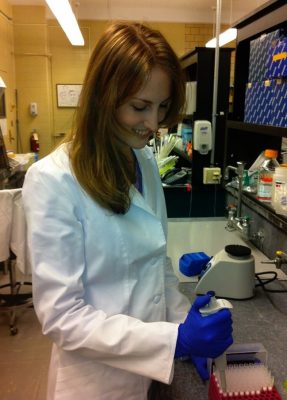Student Spotlight: Annabelle Beaver

What is your area of research?
I am a third year Ph.D. student in animal science with minors in epidemiology and microbiology. I am currently researching Johne’s disease, a chronic and progressive enteritis in dairy cows and other ruminants.
What inspired you to choose this field of study?
The welfare of animals has always been one of my primary interests. The devastating effects of Johne’s and the challenges this disease presents are particularly compelling.
Why is this research important?
Johne’s disease research is vital since the disease can adversely affect the welfare of cows and result in substantial economic loss for the dairy industry. There is currently no cure for Johne’s disease. The etiologic agent is Mycobacterium avium subsp. paratuberculosis (“MAP”). This bacterium is particularly dangerous in dairy herds because of its lengthy incubation period, during which time infected animals can actively shed the bacteria into manure and milk. Calves are particularly susceptible and may acquire MAP from adult cow manure or by ingesting contaminated milk. Thus MAP infection may be silently perpetuated and the within-herd prevalence may steadily increase, unbeknownst to producers. Once clinical symptoms appear, an infected animal will eventually die of dehydration and cachexia.
Johne’s disease research is also important from a human-health standpoint, since the bacteria have been implicated as a possible cause of Crohn’s disease in humans. MAP bacteria may enter the milk supply as a result of direct shedding or environmental contamination, and consumption of dairy products could represent a source of transmission to humans.
How has your background influenced your scholarship?
I was an undergraduate English/creative writing/theatre major at Princeton University and a harpist in the university orchestra. Although my shift in focus to the animal science sphere required a re-doubling of effort, I discovered that my artistic background actually translated well into the fabric that defines a researcher. My training in counterpoint and harmony fine-tuned my ability to view research through a mathematical-modeling and statistical lens. Close readings of literature sharpened my observation skills and became a resource for my scientific writing. Stage presence has enhanced my presentation effectiveness.
What else has influenced your thinking as a researcher or scholar?
My Master’s degree program in animal behavior and conservation at Hunter College (CUNY) was essential in discovering my study objectives, introducing me to a broad range of research perspectives. I was exposed to the field of statistics and found it to be a fascinating discipline. A summer position as a Visiting Researcher at the University of British Columbia’s Dairy Education and Research Center in 2012 also represented a decisive step in my evolution. I was involved in a cow/calf research project, examining calf nutritional dependency. During this time, it became black and white: cows and dairy farm issues would be my subjects! Here, I saw research in action and the importance of real-world application. At Cornell, I have particularly enjoyed my courses in epidemiology, microbiology, and statistics.
You recently received a Fulbright U.S. Student Fellowship to conduct research in the Netherlands. Congratulations! What was the application process like?
It was a bit intimidating at first, but the Einaudi Center at Cornell was a very helpful resource for any questions that arose during the process. They provide information sessions and review grant proposals and completed applications prior to submission.
What will you be researching in the Netherlands?
I will be continuing to research Johne’s disease in collaboration with research groups at Wageningen University. The disease has a high prevalence in the Netherlands as well as in the United States. I will be conducting frequent farm visits to understand perspectives and strategies for Johne’s control in the Netherlands. Paired with this hands-on work, I aim to develop a stochastic multi-compartmental mathematical model to further grasp the nuances of MAP infection and transmission in dairy herds. My intent is to expand existing models using an abundant and increasing body of relevant data collected personally and by Cornell-affiliated research groups. Additionally, there are certain subtleties of on-farm prevalence that have not yet been modeled. In focusing on these elements, I hope to eventually uncover new or enhanced approaches for the mitigation of MAP spread within and between herds.
In what ways will the research you conduct on this trip be vital to your scholarship?
My research project in the Netherlands will facilitate interaction with the dairy and veterinary community as well as with academic institutions. This international perspective on Johne’s disease control from a variety of sources will be vital to my scholarship.
Any advice for other graduate students interested in applying for fellowships or grants?
I suppose my advice would be to follow through with the applications no matter how daunting they become during the process. I have seen firsthand that the time and effort can be rewarded! At times you may feel that the chances of receiving the grant or fellowship are remote, but don’t listen to the voice of the Imposter Syndrome in your ear.
Why did you choose Cornell to pursue your degree?
After I discovered my interest in farm animals, and in particular dairy cows, I attended several pertinent lectures and began to research relevant literature. Much of what I read and heard during this time had one factor in common: The researchers were in some way affiliated with Cornell University. I reasoned that attending Cornell would afford me the best chance of making an impact in the field (and on the farm!).
What’s next for you?
I’ll be learning some Dutch in my spare time!
But in the long term, I am hoping that my career path with allow me to continue hands-on dairy cattle research into other large-scale herd-health and welfare issues.
Interview by Sally Kral, communications and outreach assistant in the Graduate School

